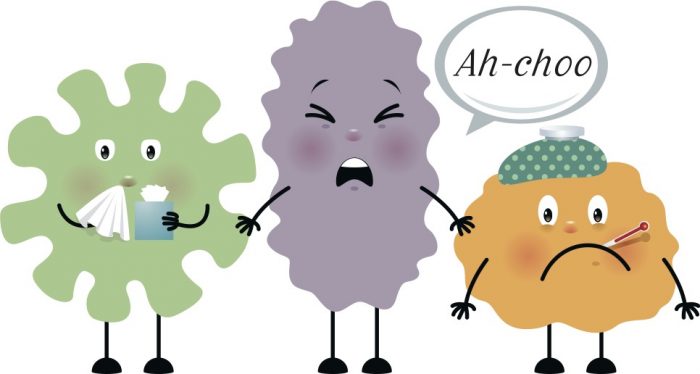Medical Compass: Welcome to hay fever season

Over the counter medications help some sufferers
By David Dunaief, M.D.

This past weekend, we adjusted our clocks for Daylight Saving Time, the unofficial end of winter. Because it’s been warmer than usual this winter, I’ve noticed crocuses and daffodils are already sprouting and we’re just a few weeks out from full scale tree buds.
For people who suffer from seasonal allergic rhinitis, hay fever, seasonal allergies or whatever you would like to call it, life is about to get really uncomfortable. Just over 25 percent of U.S. adults were diagnosed with seasonal allergies in 2021, and 18.9 percent of children were diagnosed, according to the Centers for Disease Control and Prevention (1). The triggers for seasonal allergies are diverse. They include pollen from leafy trees and shrubs, grass and flowering plants, as well as weeds, with the majority from ragweed (mostly in the fall) and fungus (summer and fall) (2).
What triggers allergic reactions?
A chain reaction occurs in seasonal allergy sufferers. When foreign substances such as allergens (pollen, in this case) interact with immunoglobulin E (IgE), antibodies that are part of our immune system, they cause mast cells in the body’s tissues to degrade and release inflammatory mediators. These include histamines, leukotrienes and eosinophils in those who are susceptible. In other words, it is an allergic inflammatory response.
The revved up immune system then responds with sneezing; red, itchy and watery eyes; scratchy throat; congestion; sinus headaches; postnasal drip; runny nose; diminished taste and smell; and even coughing (3). Basically, it emulates a cold, but without the virus. If symptoms last more than 10 days and are recurrent, then it is likely you have allergies, not a virus.
If allergic rhinitis is not treated properly, you can experience complications like ear infections, sinusitis, irritated throat, insomnia, chronic fatigue, headaches and even asthma (4).
What medications help?
The best way to treat allergy attacks is to prevent them, but this is can mean closing yourself out from the enjoyment of spring by literally closing the windows, using the air-conditioning, and using recycling vents in your car.
On the medication side, we have intranasal glucocorticoids (steroids), oral antihistamines, allergy shots, decongestants, antihistamine and decongestant eye drops, and leukotriene modifiers (second-line treatment only).
The guidelines for treating seasonal allergic rhinitis with medications suggest that intranasal corticosteroids (steroids) should be used when quality of life is affected. If there is itchiness and sneezing, then second-generation oral antihistamines may be appropriate (5). Two well-known inhaled steroids are Nasacort (triamcinolone) and Flonase (fluticasone propionate). While inhaled steroids are probably most effective in treating and preventing symptoms, they need to be used every day and can have side effects, like headaches.
Oral antihistamines, on the other hand, can be taken on an as-needed basis. Second-generation antihistamines, such as loratadine (Claritin), cetirizine (Zyrtec) and fexofenadine (Allegra), have less sleepiness as a side effect than first-generation antihistamines, but don’t work for everyone.
Alternative treatments
Butterbur (Petasites hybridus), an herb, has several small studies that indicate its efficacy in treating hay fever. In one randomized controlled trial (RCT) involving 131 patients, results showed that butterbur was as effective as cetirizine (Zyrtec) (6).
In another RCT, results showed that high doses of butterbur — 1 tablet given three times a day for two weeks — was significantly more effective than placebo (7). Researchers used butterbur Ze339 (carbon dioxide extract from the leaves of Petasites hybridus L., 8 mg petasines per tablet) in the trial.
A post-marketing follow-up study of 580 patients showed that, with butterbur Ze339, symptoms improved in 90 percent of patients with allergic rhinitis over a two-week period (8). Gastrointestinal upset occurred as the most common side effect in 3.8 percent of the population.
The caveats to the use of butterbur are several. First, the studies were short in duration. Second, the leaf extract used in these studies was free of pyrrolizidine alkaloids (PAs). This is very important, since PAs may not be safe. Third, the dose was well-measured, which may not be the case with over-the-counter extracts. Fourth, there are interactions with some prescription medications.
Treating allergies with diet?
While there are no significant studies on diet, there is one review of literature that suggests that a plant-based diet may reduce symptoms of allergies, specifically rhinoconjunctivitis, affecting the nose and eyes, as well as eczema and asthma. This is according to the International Study of Asthma and Allergies in Childhood study in 13- to 14-year-old teens (9). In my clinical practice, I have seen patients who suffer from seasonal allergies improve and even reverse the course of allergies over time with a vegetable-rich, plant-based diet, possibly due to its anti-inflammatory effect. Analogously, some physicians suggest that their patients have benefited from removing dairy from their diets.
While allergies can be miserable, there are a significant number of over-the-counter and prescription options to help reduce symptoms. Diet may play a role in the disease process by reducing inflammation, although there are no formal studies. There does seem to be promise with some herbs, like butterbur. However, alternative supplements and herbs lack large, randomized clinical trials with long durations. Always consult your doctor before starting any supplements, herbs or over-the-counter medications.
References:
(1) CDC.gov. (2) acaai.org/allergies/types/pollen-allergy. (3) J Allergy Clin Immunol. 2003 Dec;112(6):1021-31.. (4) J Allergy Clin Immunol. 2010 Jan;125(1):16-29.. (5) Otolaryngol Head Neck Surg. 2015 Feb;2:197-206. (6) BMJ 2002;324:144. (7) Arch Otolaryngol Head Neck Surg. 2004 Dec;130(12):1381-6. (8) Adv Ther. Mar-Apr 2006;23(2):373-84. (9) Eur Respir J. 2001;17(3):436-443.
Dr. David Dunaief is a speaker, author and local lifestyle medicine physician focusing on the integration of medicine, nutrition, fitness and stress management. For further information, visit www.medicalcompassmd.com or consult your personal physician.






